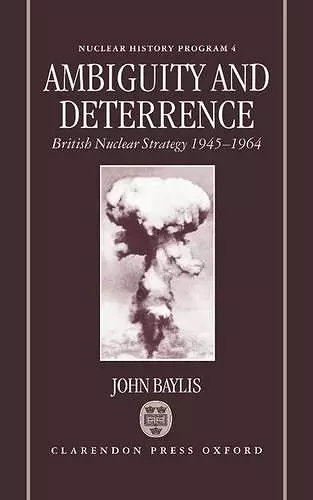Ambiguity and Deterrence
British Nuclear Strategy 1945-1964
Format:Hardback
Publisher:Oxford University Press
Published:28th Dec '95
Currently unavailable, and unfortunately no date known when it will be back

Ambiguity and Deterrence focuses on the role of competing strategic beliefs in the formulation of British nuclear strategy between 1945 and 1964. Based on recently released documents, it is argued that the British approach to nuclear weapons during this formative period was characterized by paradox and ambiguity. The paradox was that while there was a widespread consensus in political and military circles in favour of nuclear deterrence, there were constant disagreements over the requirements of an effective deterrent policy. These disagreements centred on six main questions: whether deterrence was best achieved through `punishment' or `denial'; whether deterrence necessitated nuclear superiority; whether preparations had to be made for a long war or a short war; what strategic implications followed from nuclear stalemate; whether limited nuclear wars could be fought without escalation to all-out nuclear war; and whether pre-emption was politically acceptable and militarily necessary. It is argued that the failure of successive governments to provide clear political direction on these issues meant that British nuclear strategy was more ambiguous and much less coherent than is usually supposed.
This study, as its extensive bibliography testifies, covers well-trodden ground, but in its shrewd use of sources, some of them newly available, it throws a thought-provoking light on the subject. Professor Baylis exposes rigorously but objectively the various contradictions and weaknesses in ministerial and Chiefs' of Staff papers of the period ... When the documents of 1965/70 are released a sequel to Professor Baylis's compelling book, assessing how these changes affected decision-making, will make fascinating reading. * RUSI Journal *
John Baylis is at his best and extremely interesting in his account of how the three Service Chiefs of Staff approached the development of a nuclear strategy ... this admirable book represents really good history. It is not easy reading, but immensely worthwhile for anyone who seeks to understand the role of the British deterrent, and arguably, the future now that the Cold War is over. It does one no harm to concentrate one's mind occasionally, and, in my view, Professor Baylis' story well merits the necessary effort. * Army Quarterly and Defence Journal *
John Bayliss had produced a work of considerable scholarship as part of the international Nuclear History Program ... it is a tribute to the author's skill that it remains easy to read and the arguments are clear throughout ... Many of the issues discussed by Baylis have been analysed elsewhere but the strength of this book is that it deals with them in a comprehensive manner and it ranges over a broad period of time. * G. Wyn Rees, University of Leicester, Political Studies, Vol. 45, No. 1, March '97 *
A magisterial book. It is both a work of synthesis, although much of the work synthesized was written or inspired by him, and of detailed archival research. It addresses all of the major debates in post-war British strategic history and delivers well-founded judgements. This book is also remarkably rich in detailed information and analysis. * Catherine Baxter, Intelligence and National Security, Vol.12 Number 3 *
ISBN: 9780198280125
Dimensions: 224mm x 145mm x 34mm
Weight: 769g
512 pages